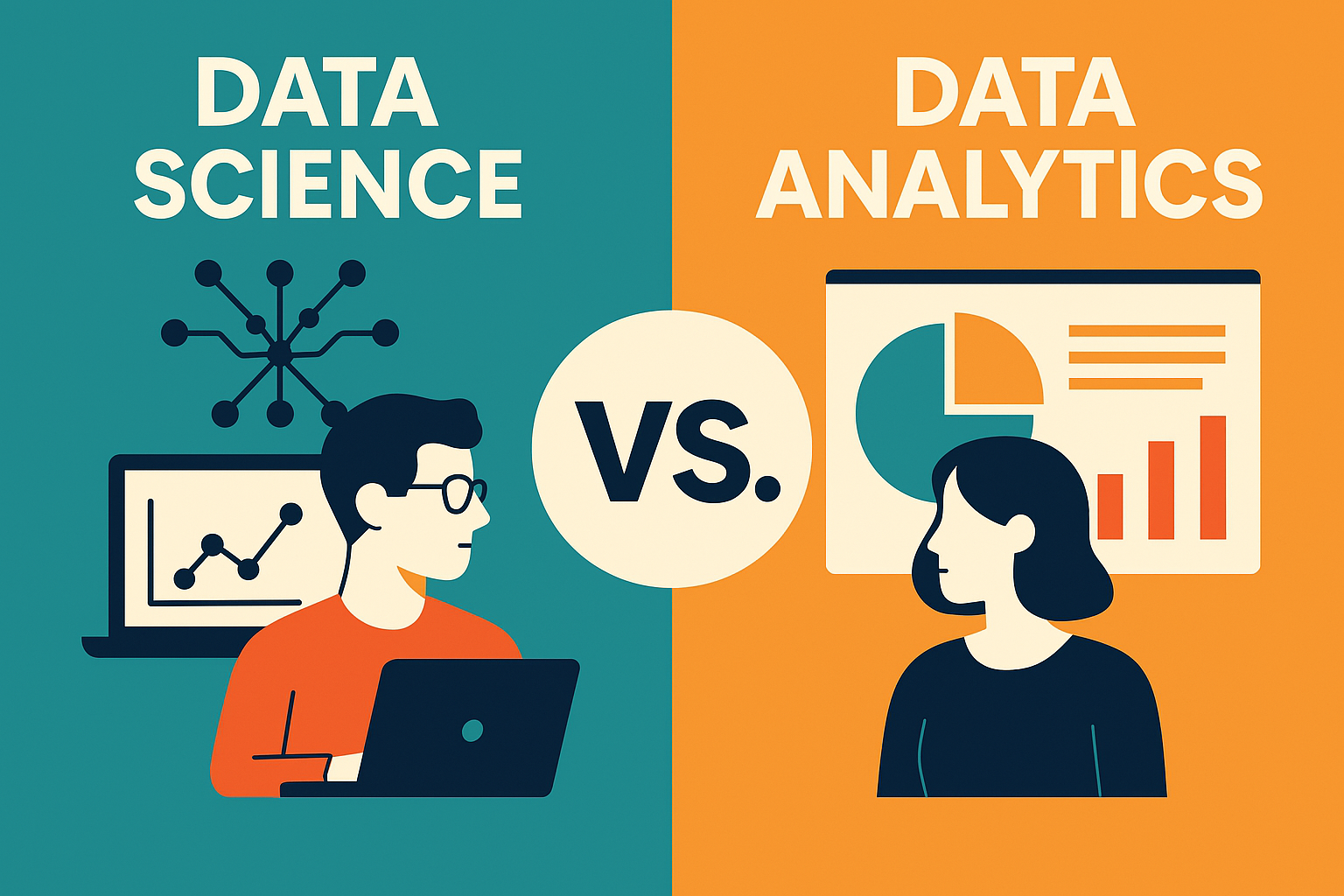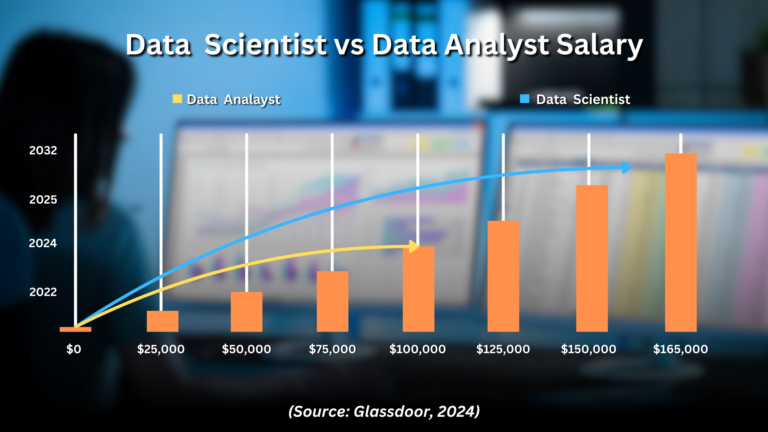Data Science vs Data Analytics
- March 20, 2025
- user
- 1

Data Science vs Data Analytics: What Are the Differences?
Data Science vs Data Analytics: What Are the Differences?
The World Economic Forum Future of Jobs Report 2023 lists data analysts and data scientists as two of the most in-demand, high-paying jobs. Both roles work with data in different ways, but many professionals find it challenging to understand the disparities in job responsibilities, pay, and career advancement.
We’ll look at the comparison between data analysts and data scientists as regards their roles, the competencies they employ, and how each can be attained.
- ➡️ Which career path should I pursue? Data Scientist or a Data Analyst?
- ➡️ What are the key differences between Data Science and Data Analytics?
- ➡️ Which career has better salary and growth opportunities?
Projected Growth in job opportunities - The US Bureau of Labor Statistics predicts a 36% growth in data scientist jobs between 2023 and 2033, considerably outperforming the average for all occupations. Data analyst jobs are expected to grow by 23% between 2023 and 2033, also a high-growth area.
💰 Salary Comparison: Both fields offer high-paying jobs, but Data Science typically pays more due to its technical complexity.

What is Data Science?
Data Science is an advanced field combining programming, machine learning, statistics, and AI to extract meaningful insights and predict future trends from data. It is a forward-thinking industry. Typically work with structured data to solve tangible business problems using tools like SQL, R or Python programming languages, data visualization software, and statistical analysis.
Organizations of all sizes now depend on data science to drive decisions and strategic planning. The combination of artificial intelligence, machine learning, and specialized programming helps uncover applicable information within organizational data. On top of that, data science plays vital roles in healthcare, education, aviation, and many more sectors. The development of artificial intelligence and machine learning technologies has made data processing faster while building a strong network of educational courses and career paths.
Role and Skills of a Data Scientist
- Collecting, cleaning, and manipulating raw datasets
- Constructing predictive models and machine learning algorithms for big data mining
- Creating analytical processes and tools to monitor and ensure the accuracy of datasets
- Creating reports, dashboards, and other data visualization tools to present findings
- Writing software applications aimed at the automation of data gathering and processing
Organizations of all sizes now depend on data science to drive decisions and strategic planning. The combination of artificial intelligence, machine learning, and specialized programming helps uncover valuable insights within organizational data. Additionally, data science plays a vital role in various industries, including healthcare, education, aviation, and more.
🛠 Common Tools & Technologies:
- Programming: Python, R, SQL
- Machine Learning: TensorFlow, Scikit-Learn, PyTorch
- Big Data: Hadoop, Apache Spark
- Visualization: Tableau, Matplotlib, Seaborn
What is Data Analytics?
Data analysts examine large datasets to identify trends, develop charts, and create visual presentations that help businesses make informed decisions. Their work involves explaining what has already happened, not predicting what’s next.
Role and Skills of a Data Analytics
- Working with managers within the organization to determine what information is helpful and useful.
- Collecting data from both primary and secondary sources.
- Preparing the data for analysis, which includes cleaning and restructuring.
- Examining data sets to discover useful trends and patterns that can be transformed into insights.
- Presenting the findings in a way that can easily inform decision-making.
Modern analytics uses various computing techniques such as natural language processing, text mining, sensor data analysis, and outlier analysis. Companies can automate analytical tasks with minimal human input or outsource their analytics needs to focus on core operations.
🛠 Common Tools & Technologies:
- Data Querying: SQL
- Data Visualization: Excel, Tableau, Power BI
- Statistical Analysis: Python, R, SAS
- Business Intelligence Tools: Google Analytics, Looker, Tableau, Matplotlib, Seaborn
Difference Between Data Science and Data Analytics?
Data science and data analytics play different roles in today’s data-driven world. These differences matter a lot when choosing a career path or creating data strategies that work.
Data science works like a big umbrella that includes many tasks to find patterns in large datasets. This field brings together multiple disciplines and focuses on:
- Building statistical models
- Developing algorithms
- Training machine learning models
- Creating frameworks for automation
- Powering business intelligence platforms
Data analytics looks at specific datasets to extract value and answer targeted questions. Analysts use existing tools and frameworks to interpret data and make quick business decisions.
The difference goes beyond just tools and techniques. Data scientists predict the unknown through algorithms and statistical models. Analysts look at datasets to spot trends and create visual presentations that help make strategic decisions. Educational requirements show a big gap between these roles.
These differences help companies use their resources better and professionals choose career paths that match their interests and strengths. Both roles turn data into valuable insights, just through different approaches and methods.
Choosing Between a Career in Data Science vs Data Analytics
Choosing between data science and data analytics careers depends on three crucial factors: your educational background, what interests you, and how you see your career growing. Join thousands of successful businesses. The educational path is different for each role. Data analysts just need basic skills in mathematics, statistics, or a related field. Data scientists need more advanced skills. Your skill level sometimes matters more than formal education, especially in data analyst roles.
Let’s think over your interests and strengths to choose between these paths:
| Career Aspect | Data Science | Data Analytics |
|---|---|---|
| Best Suited For | Building models, finding hidden patterns, calculating unknowns | Analyzing business metrics, translating numbers into action |
| Primary Focus | Creating new processes and frameworks | Applying existing tools for business decisions |
| Technical Depth | Advanced programming and algorithms | Data interpretation and visualization |
Best Courses for Data Science & Data Analytics
Skillify Solutions runs specialized bootcamps that provide practical skills in data science and analytics. Students work with real-world datasets from finance, healthcare, and government sectors. They receive tailored mentorship throughout their experience to master industry-standard tools and technologies.
Students learn through a hands-on approach with:
- One-on-One Mentorship
- Interview Preparation
- Resume Building
- Mock Interviews
- Networking Opportunities
The Data Science Bootcamp helps professionals gain expertise in:
- Advanced Python Programming
- Machine Learning Algorithms
- Data Workflow Management
- API Integration
- GitHub Version Control
The Data Analytics Bootcamp focuses on:
- Intermediate Python Skills
- Excel Mastery
- JavaScript Fundamentals
- SQL Database Management
- Tableau Visualization
Skillify Solutions takes an integrated approach with these detailed programs. Graduates gain both theoretical knowledge and practical skills needed to succeed in their data careers. The part-time schedule is designed to accommodate both working professionals and students. The curriculum builds step by step, from basic concepts to advanced applications.
Want to start your data career? Skillify Solutions’ Data Science Bootcamp can help you succeed. Industry experts will guide you through hands-on projects. The detailed curriculum and one-on-one mentoring will give you the expertise to excel in data science or analytics roles.
Frequently Asked Questions
As for data Science, the emphasis is placed on constructing paradigmatic predictive models and formulating new frameworks that aid in examining trends of the future, while as for data analytics, it mainly interprets the data existing to inform time-sensitive business decisions.
Data science is complex. It includes advanced programming, machine learning, and predictive modeling. Data analytics looks at existing data. It needs a good grasp of statistics and visualization. Also, it is usually less technically demanding.
It is always needed to know the bare minimum of programming, like Python or SQL, but with Tableau and Power BI analysts can perform well without programming knowledge. The analysts’ software offers these tools to ensure results without demanding as strong programming skills.
Other roles comprise Machine Learning Engineer, Data scientist, Data Analyst, Data Engineer, Business Intelligence Analyst, and others, each with a different set of duties that also can have varying differences in skills.
Along with assistance from peers where and whenever valuable solutions were required, by Skillyfy solution experts, becoming good is backed with solid Mathematics, Statistics, and Computer Science fundamentals.
A data scientist often shifts to more senior research roles or takes on a more technical leadership role, but can also move into the CTO role. On the other hand, data analysts usually transition to senior data analysts, analytics managers, or business intelligence managers.



This is a good read.! Data science has been a promising career choice, but very hard to master. I prefer intrusctor-led sessions, vs self-learning.